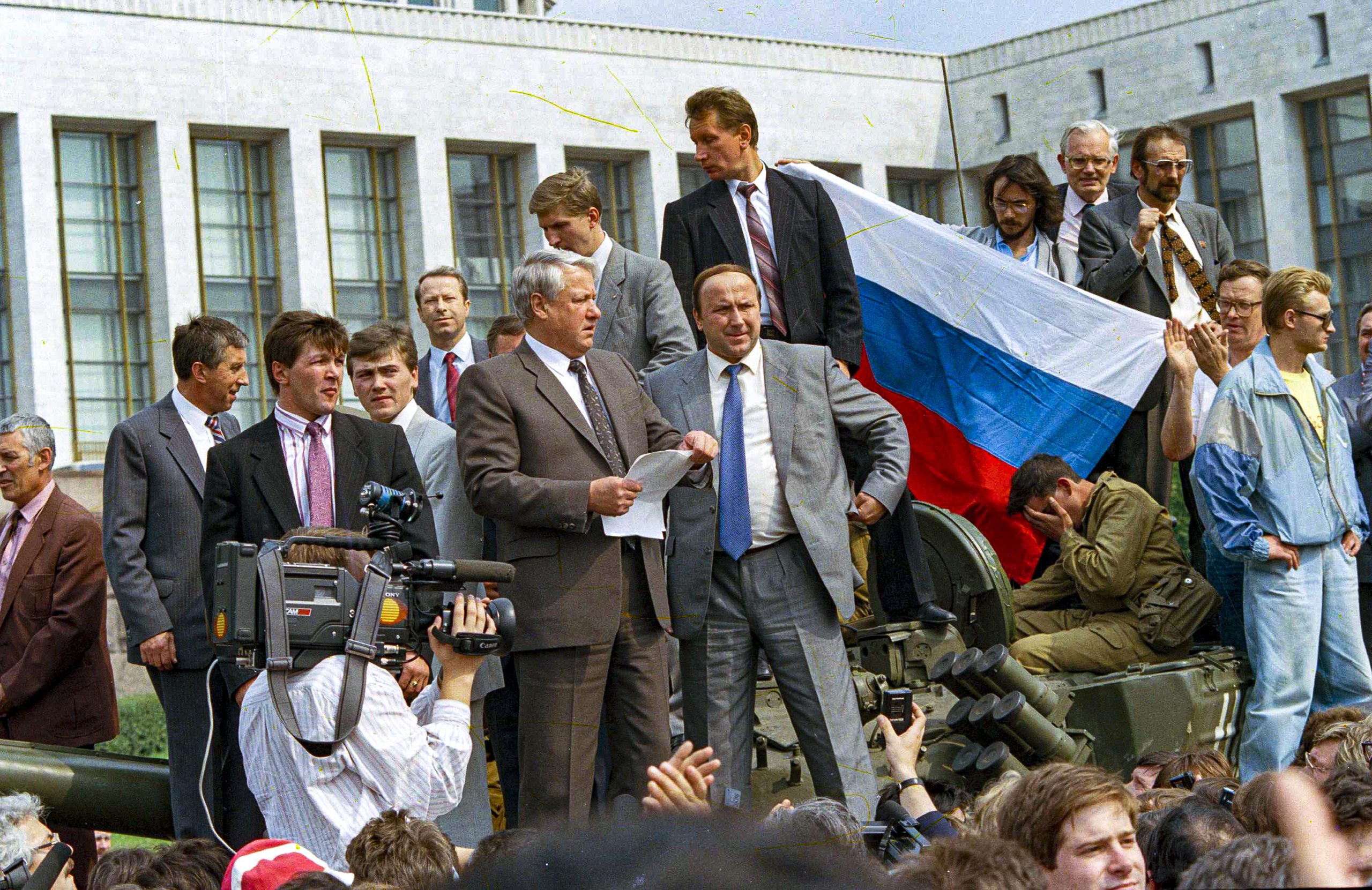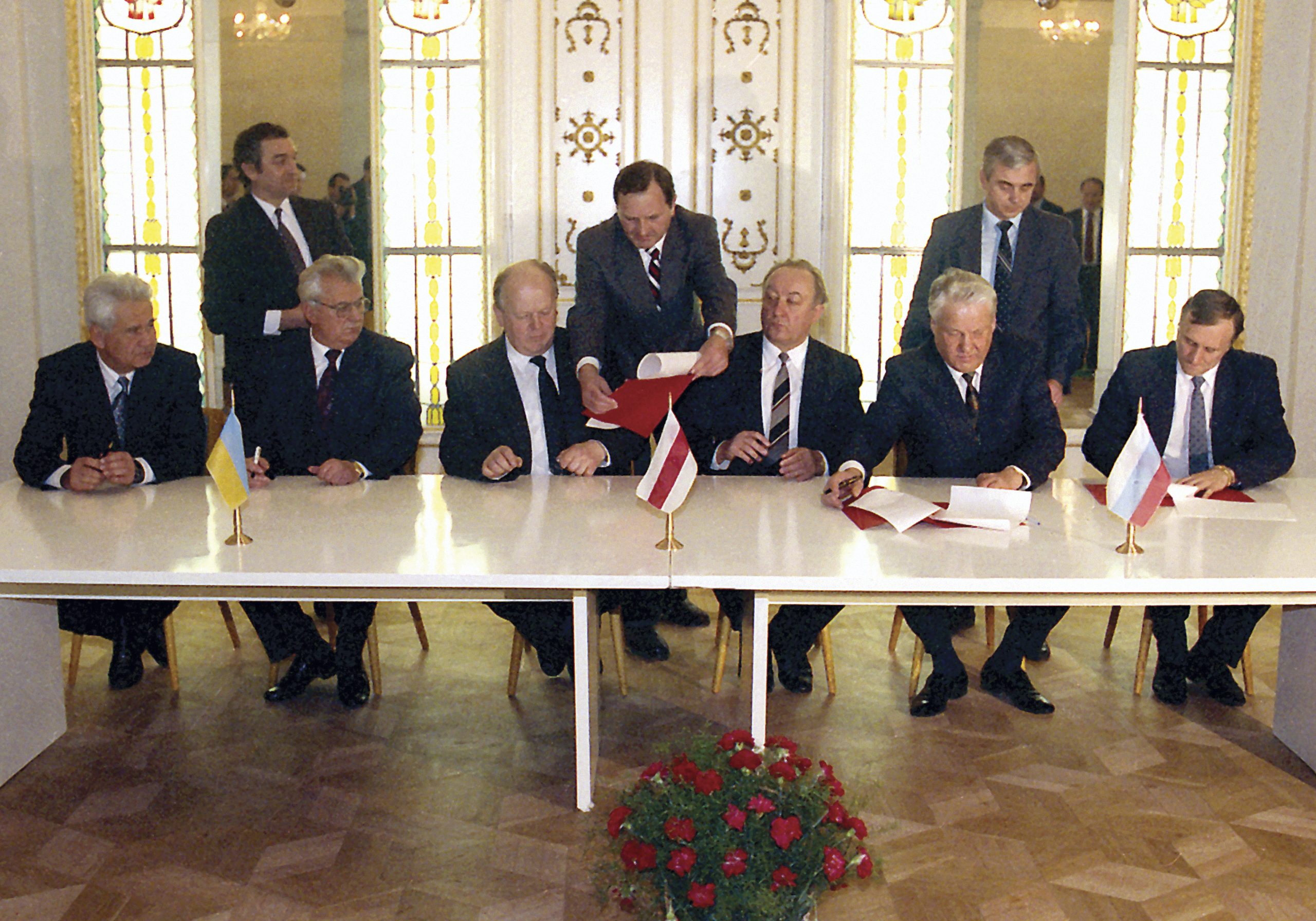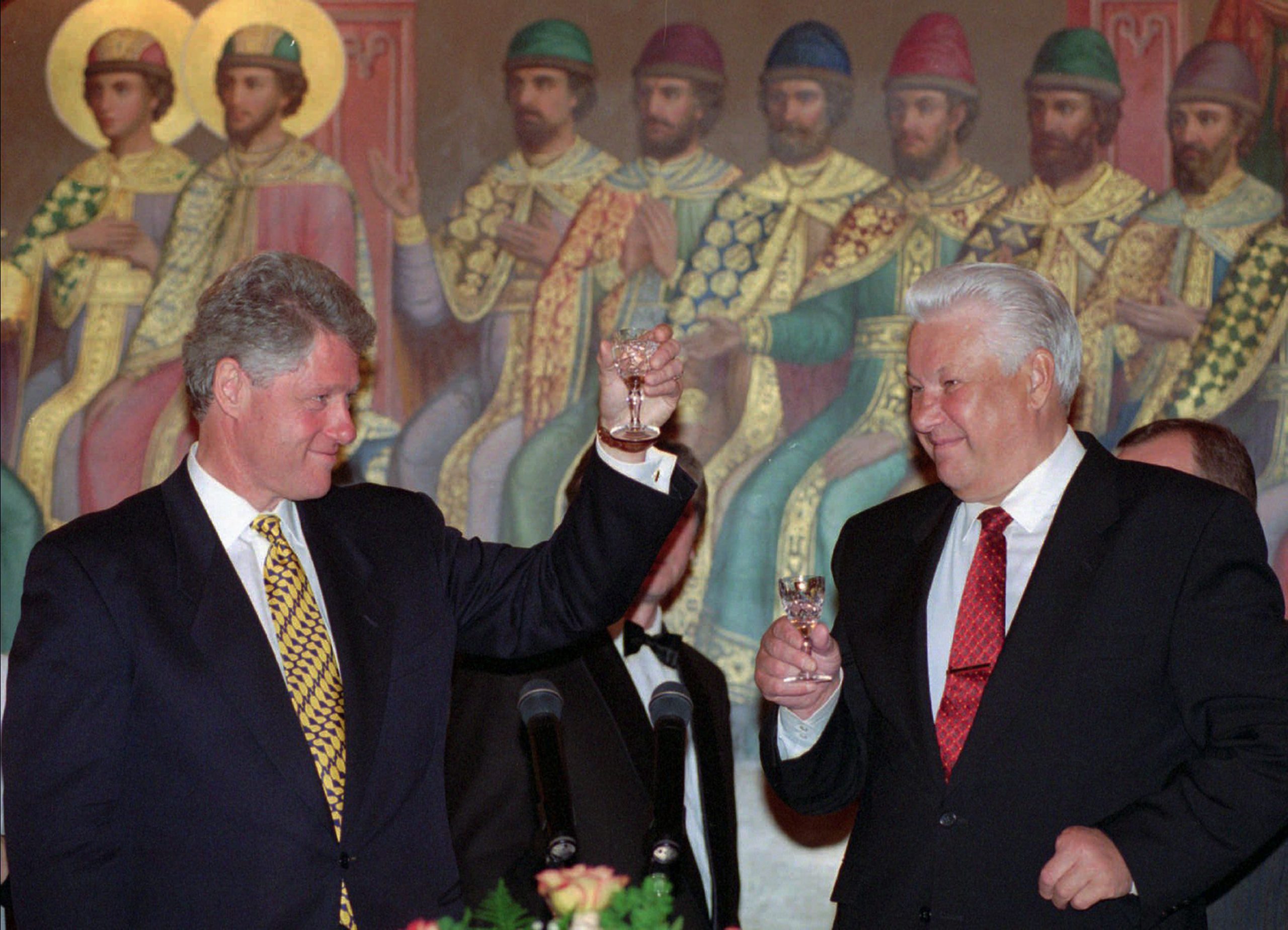It was the August coup of 1991, and the Soviet Union was on its knees, inexplicably crippled by stalwart communists who seized the Kremlin and declared themselves in charge of the USSR — a golden opportunity for a Russian politician to forward an agenda that would lead to the empire’s downfall.
Climbing aboard a tank outside the Russian parliament, a champion arrived. Boris Yeltsin, who had been crusading to pull Russia out of the USSR and transform it into a free market democracy in the mold of the United States, delivered a blistering speech eviscerating the coup and calling for the rightful president of the USSR, Mikhail Gorbachev, to be released from house arrest in Crimea. Months later, his wish came true: The Soviet Union fractured, with satellite nations and Soviet republics, including Ukraine, splintering off.
“I think he shares the primary role with Gorbachev in the fall of the Soviet Union,” Vladislav Zubok, author of Collapse: The End of the Soviet Union, told the Washington Examiner. “His idea was ‘Gorbachev cannot take a leap to democracy and market. I will do it, but I will do it within the Russian Federation. And I will make sure the Russian people will have the American dream.’”
BIDEN SAYS PUTIN WANTS TO ‘REESTABLISH THE FORMER SOVIET UNION’

Yeltsin, who served as a delegate from Moscow in the Congress of People’s Deputies of the Soviet Union, became the head of the Russian Federation in 1990 and quickly signed a declaration of sovereignty several weeks after being sworn into office. Although Russia technically did not become sovereign until almost a year and a half after the declaration, Yeltsin’s actions inspired the other Soviet republics to push for independence.
“He sort of began to act to pull the Russian Federation like a rug from under Gorbachev, and what it meant is that Russia was pulled out of the Soviet Union and became ruled by Yeltsin the democrat. … What was Gorbachev supposed to do?” Zubok said. “The capital of the Soviet Union was Moscow, the Russian capital.”
The Russian Federation was the largest of the 15 Soviet republics. To many outside observers, Russia was practically synonymous with the USSR. The capital of both governments was located in Moscow. But to Yeltsin, Russia was distinct from the USSR, and independence could serve as an escape path from the dire economic conditions of the communist state.
Just two months before the fall of the Berlin Wall in 1989, Yeltsin visited the United States. At one point, following a tour of a NASA facility, he took a pit stop at a grocery store in Texas to get a sense of how everyday Americans live. He was shaken to his core by what he witnessed. The U.S. system produced a level of prosperity far beyond what a layperson in the USSR had.
“That opened his eyes. People who traveled with him wrote how he became such a big fan of America, liberal democracy, and the market economy. And so he returned full of stories about fantastic supermarkets and how even average people could buy what they wanted,” Zubok said. “Yeltsin had a transformative moment. He suddenly realized the future is not the Soviet Union — the future is Russia.”
PUTIN ‘READY’ FOR TALKS WITH KYIV, KREMLIN SAYS
Conditions in the USSR had deteriorated by the 1990s. Its war in Afghanistan and arms race with the U.S. had forced it to divert resources from key industrial sectors of its centrally planned economy to the military. The strain this put on its economy fueled social unrest and led to increased domestic violence across the USSR.
Gorbachev attempted to enact reforms to address those problems but faced numerous setbacks. Meanwhile, Yeltsin’s profile in Russia grew as he began fueling Russian nationalism. His speech during the 1991 August coup made him a national hero.
“When they began to talk, Gorbachev and Yeltsin, Yeltsin had phenomenal success above all because Gorbachev’s reforms were failing, so people grew angry because of a bad economy, chaos, violence, nationalist violence — they all turned to Yeltsin who, like Trump today, said, ‘If I’m in power, everything will be great,’” Zubok said. “It was a two-big-bears-in-one-cage phenomenon.”
Yeltsin and Gorbachev competed for power, and both attempted to rule their “sovereign” entities from Moscow after Yeltsin became the head of the Russian Federation. This led to disputes over who controlled taxes and hurt the ruble.
Gorbachev was like a rock star to the West at the time. The West was skeptical of Yeltsin, so he attempted to win favor with them — a bid crucial to his power struggle with Gorbachev, according to Zubok. To achieve this, Yeltsin recognized Ukrainian independence and supported the independence of the Baltic states. These actions helped seal the fate of the communist state.

Following the collapse of the USSR in December 1991, Yeltsin became the president of the newly independent Russia. He believed an independent Russia could develop close ties with the West and attain similar levels of prosperity. While this vision came to fruition in several former Soviet republics and satellite nations — such as Estonia, East Germany, and Poland, which established vibrant free market economies — Russia was not so fortunate. Ironically, Yeltsin sowed the seeds against it with his fateful 1999 appointment of Vladimir Putin as prime minister of Russia. Putin was a former KGB agent and a member of Yeltsin’s inner circle.
Yeltsin began privatizing national companies and eliminating price controls. His reforms initially led to soaring inflation and the rise of the Russian oligarchy. He worked to mend ties with the West and traveled to the U.S., which similarly sought to thaw relations with its former rival. Yeltsin was also notorious for his drinking habit.
“We can’t ever forget that Yeltsin drunk is better than most of the alternatives sober,” former President Bill Clinton once said, as recounted by former Deputy Secretary of State Strobe Talbott in his book The Russia Hand.
At one point, during a visit to Washington, D.C., to meet with Clinton in the mid-1990s, Yeltsin became extremely intoxicated. He managed to evade security and meander outside the Blair House, where White House guests stay, onto Pennsylvania Avenue. Standing in the streets of the capital wearing nothing but underwear, Yeltsin began incoherently shouting for a cab. He wanted pizza.

CLICK HERE TO READ MORE FROM THE WASHINGTON EXAMINER
Yeltsin served as the head of Russia from 1991 until his resignation in 1999 following public outcry over a corruption scandal. He was accused of taking bribes from a construction company that had been given important government contracts. Yeltsin appointed Putin as his successor, who gave Yeltsin lifelong immunity from prosecution. In 1993, Yeltsin signed a decree that abolished the Russian parliament, then known as the Supreme Soviet, accusing it of blocking his economic reforms. Some critics believe this action set the stage for the newly independent Russian state to become authoritarian.
The economic reforms Yeltsin implemented appeared to pay off during the early Putin years, but eventually, Putin’s actions, such as his war in Georgia and annexation of Crimea, would cause Russia’s relationship with the West to deteriorate, stunting his country’s economic growth. Yeltsin died in 2007 and was buried in Moscow.
“Putin tries not to speak too much about Yeltsin because it was Yeltsin that appointed him heir apparent — made him who he is,” Zubok said. “At the same time, much of what he did is to reverse much of Yeltsin’s legacy. That is, turn against the West, kill democracy, and, most importantly, reverse the disintegration of the Soviet Union in some way or another.”

